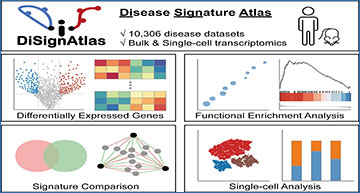Molecular signatures are usually sets of biomolecules that can serve as diagnostic, prognostic, predictive, or therapeutic markers for a specific disease. Omics data derived from various high-throughput molecular biology technologies offer global, unbiased and appropriately comparable data, which can be used to identify such molecular signatures. To address the need for comprehensive disease signatures, researchers at Chongqing Medical University developed DiSignAtlas to provide transcriptomics-based signatures for a wide range of diseases. A total of 181 434 transcriptome profiles were manually curated from studies involving 1836 nonredundant disease types in humans and mice. Then, 10 306 comparison datasets comprising both disease and control samples, including 328 single-cell RNA sequencing datasets, were established. Furthermore, a total of 3 775 317 differentially expressed genes in humans and 1 723 674 in mice were identified as disease signatures by analysing transcriptome profiles using commonly used pipelines. In addition to providing multiple methods for the retrieval of disease signatures, DiSignAtlas provides downstream functional enrichment analysis, cell type analysis and signature correlation analysis between diseases or species when available. Moreover, multiple analytical and comparison tools for disease signatures are available. DiSignAtlas is expected to become a valuable resource for both bioscientists and bioinformaticians engaged in translational research.
Availability – http://www.inbirg.com/disignatlas/
Zhai Z, Lin Z, Meng X et al. (2023) DiSignAtlas: an atlas of human and mouse disease signatures based on bulk and single-cell transcriptomics. Nucleic Acids Research [Epub ahead of print]. [article]





